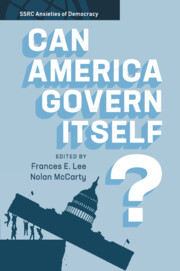Book contents
- Can America Govern Itself?
- SSRC Anxieties of Democracy
- Sponsored by the Social Science Research Council
- Can America Govern Itself?
- Copyright page
- Contents
- Acknowledgments
- 1 The Anxieties of American Democracy
- Part I Anxieties of Power, Influence, and Representation
- 2 In the Private Interest?
- 3 The Interest Group Top Tier
- 4 Developments in Congressional Responsiveness to Donor Opinion
- 5 Minority Protest and the Early Stages of Governmental Responsiveness in the Electoral Process
- 6 The Hollow Parties
- Part II Procedural Anxieties
- Part III Anxieties of Governance
- Index
- Index Authors
- References
6 - The Hollow Parties
from Part I - Anxieties of Power, Influence, and Representation
Published online by Cambridge University Press: 25 May 2019
- Can America Govern Itself?
- SSRC Anxieties of Democracy
- Sponsored by the Social Science Research Council
- Can America Govern Itself?
- Copyright page
- Contents
- Acknowledgments
- 1 The Anxieties of American Democracy
- Part I Anxieties of Power, Influence, and Representation
- 2 In the Private Interest?
- 3 The Interest Group Top Tier
- 4 Developments in Congressional Responsiveness to Donor Opinion
- 5 Minority Protest and the Early Stages of Governmental Responsiveness in the Electoral Process
- 6 The Hollow Parties
- Part II Procedural Anxieties
- Part III Anxieties of Governance
- Index
- Index Authors
- References
Summary
Today’s parties are hollow parties, neither organizationally robust beyond their roles raising money nor meaningfully felt as a real, tangible presence in the lives of voters or in the work of engaged activists. The parties have become tarred with elements of polarization that the public most dislikes—from the screaming antagonism to the grubby money chase. More than any positive affinity or party spirit, fear and loathing of the other side fuels parties and structures politics for most voters. Party identification drives American politics—but party loyalty, in the older sense of the term, has atrophied. Even the activists who do so much to shape modern politics typically labor outside of the parties, drawn to ideologically tinged “para-party” groups such as MoveOn.org on the left or the Koch-backed Americans for Prosperity on the right. The parties offer clear choices but get no credit. Our new Party Period features a nationalized clash of ideology and interests but parties that are weakly legitimized and hollowed out.
- Type
- Chapter
- Information
- Can America Govern Itself? , pp. 14 - 152Publisher: Cambridge University PressPrint publication year: 2019

